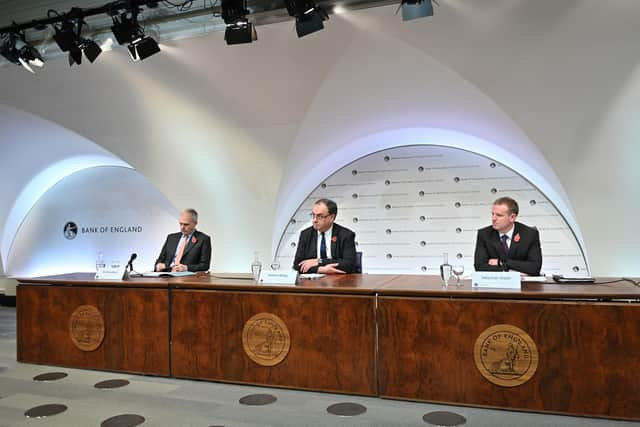Why high rates of inflation are expected to be temporary - Alex Golledge
As restrictions have been lifted, people have been spending more at shops in Yorkshire & The Humber and other businesses across the rest of the UK.
And businesses have generally grown more confident about making investment-spending decisions, many of which were postponed soon after the pandemic hit.
Advertisement
Hide AdAdvertisement
Hide AdIn its latest quarterly Report, the Bank of England’s Monetary Policy Committee (MPC) said that it expected GDP – a measure of how much economic activity, or spending, is going on – in the UK to get back to its pre-pandemic level early next year.


That’s not to say that all businesses and all households are now doing well. Some are still struggling to fully recover, especially in areas where restrictions are still in place and demand remains weak, such as foreign travel and hotels across Yorkshire reliant on corporate spending.
In many areas of the world economy, supply bottlenecks have developed – for example, there’s a severe shortage of the semi-conductors used in car manufacturing – leaving businesses short of the things they need. And, as we all know, businesses and households are facing much higher gas, oil, and electricity prices, too.
Because of the combination of higher demand, supply bottlenecks and the rises in energy prices, inflation has picked up. In the UK, the prices of the basket of things people typically buy increased by around 3 per cent between September last year and September this year.
Advertisement
Hide AdAdvertisement
Hide AdThe MPC expects consumer price inflation to rise further above our 2 per cent target and reach a peak at around 5 per cent in spring next year. But the MPC also thinks that these high rates of inflation will be temporary.
That’s because we don’t believe that demand around the world will continue growing as quickly as it has been during the initial recovery from the pandemic.
So, many of the bottlenecks and shortages that are making things difficult for businesses should ease.
But what will happen to energy prices is very uncertain – for instance, they might fall back towards their pre-pandemic levels more quickly than we assume in our forecast. In fact, gas prices have already fallen since the latest forecast was finalised. Another area of great uncertainty is the jobs market.
Advertisement
Hide AdAdvertisement
Hide AdWith the help of the furlough scheme, which closed at the end of September, the increase in unemployment since the pandemic began has been relatively small. Indeed, many of the businesses that the Bank’s agents speak to have been finding it very difficult to get enough staff.
My contacts have been telling me that chefs, drivers and all types of hospitality staff are particularly hard to find.
That said, more people were still on furlough when the scheme ended than we’d expected, and unemployment is still higher than it was just before the pandemic.
The closure of the furlough scheme isn’t expected to cause unemployment to rise much, but we don’t yet have the official data to be sure about that, making it very difficult to be certain how strong the jobs market is.
Advertisement
Hide AdAdvertisement
Hide AdGiven the high level of uncertainty, a majority of the MPC voted to keep monetary policy unchanged in November. However, the MPC also said that a rise in the base rate, which we call Bank Rate, was likely over the coming months.
Now that the recovery is underway and inflation is above target, the economy is likely to need a bit less support, to ensure that inflation returns to the 2 per cent target.
By Alex Golledge - Yorkshire Agent for the Bank of England